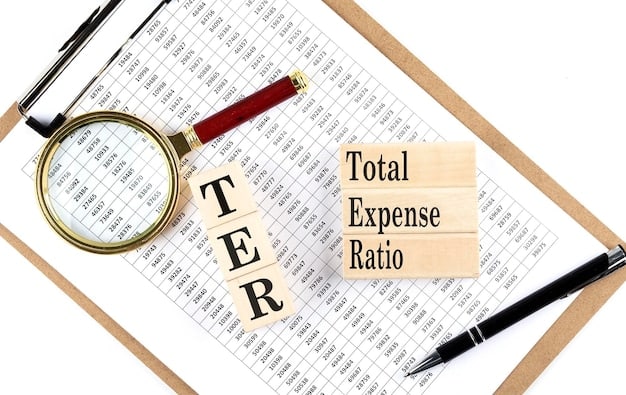New IRS Guidelines 2025: Your Guide to a Bigger Tax Refund

New IRS Guidelines for 2025: Maximizing Your Tax Refund Through Updated Deductions provides a detailed overview of the upcoming changes in tax laws, deductions, and credits, empowering taxpayers to strategically plan and potentially increase their tax refunds for the 2025 tax season.
Navigating tax season can feel like traversing a complex maze, but with the latest updates from the IRS, you can strategically optimize your return. The new IRS guidelines for 2025: maximizing your tax refund through updated deductions are designed to help taxpayers like you understand and leverage the available benefits. Stay informed and potentially boost your refund!
Understanding the Key Changes in IRS Guidelines for 2025
The Internal Revenue Service (IRS) periodically updates its guidelines to reflect changes in tax laws, economic conditions, and government policies. For the 2025 tax year, several key changes could significantly impact your tax liability and potential refund. Understanding these changes is crucial for effective tax planning.
Standard Deduction Adjustments
One of the most significant changes often involves adjustments to the standard deduction. The standard deduction is a fixed dollar amount that taxpayers can deduct based on their filing status, effectively reducing their taxable income. The IRS typically adjusts these amounts annually to keep pace with inflation.
Changes to Tax Brackets
Tax brackets, which determine the rate at which your income is taxed, are also subject to annual adjustments. Staying informed about these changes helps you anticipate your tax liability and plan accordingly. The rates themselves may also change, impacting the overall tax burden.
- Monitor Inflation Rates: Track the Consumer Price Index (CPI) to anticipate potential adjustments to tax brackets and standard deductions.
- Review IRS Publications: Regularly check the IRS website for official updates and publications related to the 2025 tax guidelines.
- Consult a Tax Professional: Seek advice from a qualified tax professional who can provide personalized guidance based on your financial situation.
Staying informed about these key changes is the first step toward effectively managing your taxes for the 2025 tax year. Being proactive ensures you’re prepared to take advantage of any new opportunities and avoid potential pitfalls.

Exploring Updated Deductions for the 2025 Tax Year
Deductions play a vital role in reducing your taxable income and, consequently, your tax liability. Several deductions are routinely updated or modified annually. Understanding these changes can lead to significant savings when you file your 2025 taxes. Whether you itemize or take the standard deduction, explore these potential opportunities.
Home Office Deduction
The home office deduction allows eligible taxpayers to deduct expenses related to the business use of their home. To qualify, the space must be used exclusively and regularly for business purposes and be the taxpayer’s principal place of business.
Itemized Deductions: Medical Expenses
Taxpayers who itemize deductions can deduct medical expenses exceeding 7.5% of their adjusted gross income (AGI). This includes payments for doctors, dentists, hospitals, insurance premiums, and other healthcare-related costs.
- Review Medical Expenses: Gather all receipts and documentation for medical expenses incurred throughout the year.
- Assess Home Office Eligibility: Determine if you meet the IRS requirements for the home office deduction.
- Consider Energy-Efficient Upgrades: Explore eligible upgrades and keep detailed records of costs and energy savings.
By carefully exploring and understanding updated deductions, taxpayers can potentially reduce their taxable income and maximize their tax refund for the 2025 tax year. Proper documentation is key to successfully claiming these deductions.
Leveraging Tax Credits for a Larger Refund in 2025
Tax credits are another powerful tool for reducing your tax liability. Unlike deductions, which reduce taxable income, tax credits directly reduce the amount of tax you owe. Several tax credits are available, and understanding their eligibility requirements can result in substantial tax savings.
Child Tax Credit
The Child Tax Credit provides a credit for each qualifying child. The amount of the credit and the eligibility requirements can change from year to year, so staying informed is essential.
Earned Income Tax Credit (EITC)
The Earned Income Tax Credit (EITC) is a refundable tax credit for low-to-moderate-income working individuals and families. The amount of the EITC depends on your income, filing status, and the number of qualifying children.
Tax credits can significantly reduce your tax liability and even result in a larger refund. Careful attention to eligibility requirements and available credits can lead to substantial tax savings.

Common Mistakes to Avoid When Filing Your 2025 Taxes
Filing taxes accurately is crucial to avoid penalties, interest, and potential audits. Even simple errors can lead to significant complications. Here are some common mistakes to avoid when preparing your 2025 tax return.
Incorrect Filing Status
Choosing the correct filing status is essential for determining your standard deduction, tax bracket, and eligibility for certain credits and deductions. Common filing statuses include single, married filing jointly, married filing separately, head of household, and qualifying widow(er).
Math Errors
Simple math errors can result in an incorrect tax liability or refund amount. Double-check all calculations, especially when dealing with complex deductions or credits. This includes ensuring all numbers are entered correctly and that all required schedules are included.
- Double-Check Calculations: Use tax software or a calculator to verify all calculations.
- Gather Necessary Documents: Collect all W-2s, 1099s, and other relevant tax documents before you begin.
- File Your Return Early: Filing early gives you ample time to correct any errors or omissions.
Avoiding these common mistakes can ensure a smooth tax filing experience and help you avoid potential issues with the IRS. Attention to detail is key to accurate and timely filing.
Planning Ahead: Tax Strategies for 2025 and Beyond
Effective tax planning involves more than just preparing your annual tax return. It’s about strategically managing your finances throughout the year to minimize your tax liability. By proactively planning ahead, you can take advantage of available opportunities and ensure you’re well-positioned for future tax years.
Maximize Retirement Contributions
Contributing to retirement accounts such as 401(k)s and IRAs can provide significant tax benefits. Contributions are often tax-deductible, reducing your taxable income in the current year. Additionally, earnings within these accounts grow tax-deferred until retirement.
Tax-Loss Harvesting
Tax-loss harvesting is a strategy that involves selling investments at a loss to offset capital gains. This can help reduce your tax liability on investment income. Be mindful of the wash-sale rule, which prohibits repurchasing the same or substantially similar investments within 30 days.
Proactive tax planning can lead to significant long-term tax savings. By taking steps to manage your finances throughout the year, you can optimize your tax situation and achieve your financial goals.
Utilizing Tax Software and Professional Assistance
Preparing your taxes can be complex, especially with evolving IRS guidelines and intricate tax laws. Tax software and professional assistance can simplify the process and ensure accuracy. These resources provide valuable support and guidance for taxpayers of all backgrounds.
Benefits of Tax Software
Tax software can guide you through the tax preparation process, helping you identify eligible deductions and credits. It also automates calculations and reduces the risk of errors. Many software options offer varying levels of support, from basic tax preparation to more comprehensive assistance.
When to Seek Professional Assistance
Consider seeking professional assistance from a qualified tax professional if you have complex tax situations, such as self-employment income, rental properties, or significant investment income. A tax professional can provide personalized advice and ensure you’re taking advantage of all available tax benefits.
- Evaluate Your Needs: Assess the complexity of your tax situation to determine whether tax software or professional assistance is best suited for you.
- Research Available Options: Explore different tax software options and compare their features and pricing.
- Seek Recommendations: Ask friends, family, or colleagues for recommendations on reputable tax professionals.
Whether you choose to use tax software or enlist the help of a tax professional, leveraging these resources can streamline the tax preparation process and ensure accuracy. Accurate filing is essential for compliance and maximizing your tax refund.
| Key Point | Brief Description |
|---|---|
| 📈 Standard Deduction | Amounts are adjusted annually for inflation, reducing taxable income. |
| 🏡 Home Office Deduction | For eligible taxpayers, deductions for home office expenses might be available. |
| 💰 Child Tax Credit | A tax credit is provided for each qualifying child, potentially reducing tax liability. |
| ⚕️ Medical Expenses | Itemized deductions can include medical expenses exceeding 7.5% of AGI. |
Frequently Asked Questions (FAQ)
▼
The key changes in IRS guidelines for 2025 primarily involve adjustments to standard deductions, tax brackets, and updates to various tax credits and deductions to keep pace with inflation and legislative changes.
▼
To maximize your tax refund in 2025, stay informed about updated deductions and credits, maintain thorough records of income and expenses, and consider contributing to tax-advantaged retirement accounts.
▼
Understanding updated deductions is crucial because it allows you to lower your taxable income, potentially leading to significant tax savings and a larger refund by claiming all eligible deductions.
▼
Tax credits directly reduce the amount of tax you owe, offering a dollar-for-dollar reduction, while tax deductions reduce your taxable income, leading to a smaller tax liability based on your tax bracket.
▼
You should seek professional tax assistance if you have complex tax situations, such as self-employment income, rental properties, significant investment income, or if you’re unsure about navigating complex tax laws.
Conclusion
Staying informed about the new IRS guidelines for 2025: maximizing your tax refund through updated deductions is essential for effective tax planning. By understanding the key changes, exploring updated deductions and credits, and avoiding common filing mistakes, you can optimize your tax strategy and potentially increase your tax refund. Utilize available resources such as tax software, and consider professional assistance when needed to navigate the complexities of the tax system effectively.





